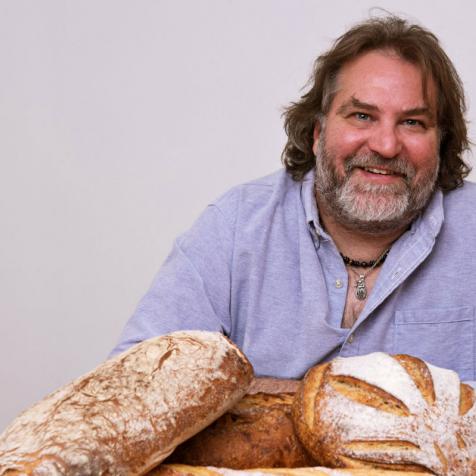
Company Details
Location
Golden, Colorado
Founded
2005
Ownership Type
Private
Employees
30
Products
Bread
Golden, Colorado
Founded: 2005
Privately owned
Employees: 30
Owners Kathy Mullen and Jeff Cleary knead a whopping 15,000 pounds of flour weekly, making 4,000 loaves of bread and about 26,000 rolls for some of Colorado's most iconic restaurants.
Building an empire of this caliber took perseverance, patience, and a fresh approach to a familiar process.
The husband-and-wife team of Mullen and Cleary launched Grateful Bread in Evergreen after shuttering their restaurant, Intrigue. Cleary -- a chef, and the Deadhead of the duo -- had operated a small bakery for the eatery. He'd worked in hotels and restaurants prior to Intrigue. "All of the restaurants had bakeries in them," he says.
When he sold Intrigue, Cleary negotiated to keep the baking equipment: a wooden table, one 20-quart mixer, and a beat-up six-tray electric oven that he used to make a few hundred pieces of bread a day in a 400-square-foot cabin.
During Grateful Bread's inaugural years, Cleary worked nonstop, doing all of the company's mixing, shaping, baking, deliveries, sales, orders, and billing. "Meanwhile," he says, "Kathy had two outside jobs to keep things afloat."

As Grateful Bread gained traction, the family-owned bakery stayed true to its handcrafted and wholesome values by focusing on quality, consistency, and freshness. And, that's paid off big time.
"A lot of a bread's flavor comes from the long fermentation process," Cleary begins, explaining, "Most bread in big factories is rushed. They put yeast accelerants and chemicals in it to speed things up."
Grateful Bread boycotts accelerants, dough conditioners, preservatives, artificial flavors and colors, stabilizers, and enhancers. What's more, Cleary buys mostly local and regional grains -- organic rye berries from Fort Collins, organic wheat berries from Nebraska -- and mills them in-house with a custom Osttiroler Getreidemühlen stone-grinding flour mill from Austria, the only one of its kind in the Rocky Mountain region.
Crafted out of solid pine and based on a centuries-old design, the company's new mill is a piece of artwork in its own right. The mill gives Grateful Bread control over the quality and content of its main ingredient -- whole grain flours -- utilizing a slow, flavor-enhancing cold stone milling process. "It's kind of old-fashioned, but the outcome is better," Mullen says.

What Cleary appreciates is the opportunity to manufacture small quantities of specialty flours, which can be expensive and tough to find. "Plus," he says, "Flour has a shelf life once it's milled." Milling in-house, Cleary makes only what he needs. "It's fresh, and I'm not having any waste," the baker says.
Cleary estimates that he mills a thousand pounds of flour a week; he supplements his own supply with King Arthur Unbleached Bread Flour. "As much as I'd like to, I can't mill all of my own flour," he says.
To accommodate their hefty new addition, Cleary and Mullen had to augment their plant. Grateful Bread outgrew its first space in 2008, and moved operations to a 2,000-square-foot facility in Golden. That site's been expanded three times now, to nearly 8,000-square feet.
Using clean dough made from freshly milled grains, Grateful Bread's bakers hand-shape loaves and buns for an authentic, artisan product. "If I automated, I could have half the amount of employees. But we're trying to create jobs for bakers. Plus, you can see the difference in the bread," Cleary says.

"We literally have trucks waiting for the bread to come out of the oven," he continues. Five of them deliver product seven days a week to an impressive lineup of 70 restaurants and hotels that span the alphabet from Acorn to Z Cuisine.
Other clients include ChoLon, Fruition, Guard and Grace, Vert Kitchen, Four Seasons Denver, and the Grand Hyatt. Grateful Bread's retail store at the bakery is open on Saturdays, and the company works the Union Station Farmers Market, too. A few spots, including Mercantile and The Truffle Cheese Shop, carry Grateful Bread. "We're selective with that, because we're worried about our reputation," says Mullen.
"As long as we can maintain quality, we'll continue to grow," she adds. But growth is going to be intentional. "I probably turn away ten account requests a week," Mullen says, explaining, "We just can't do it all."

Challenges: Labor! It can take up to a year to train a baker to consistently produce bread that meets Grateful Bread's standards; finding other people who are really passionate about bread hasn't been easy.
Opportunities: Grateful Bread is currently looking at strategies for horizontal integration. Milling in-house, for example, has opened the door for selling grits, polenta, and specialty flour wholesale. "A lot of chefs have been asking about our pastries," Cleary says, noting that, currently, they're only sold in the company's store. Other chefs have asked for dough, and that's another direction Grateful Bread might expand.
Needs: "We have great clients, and the demand is strong," Mullen says. "Now it's about finding good bakers and drivers."
